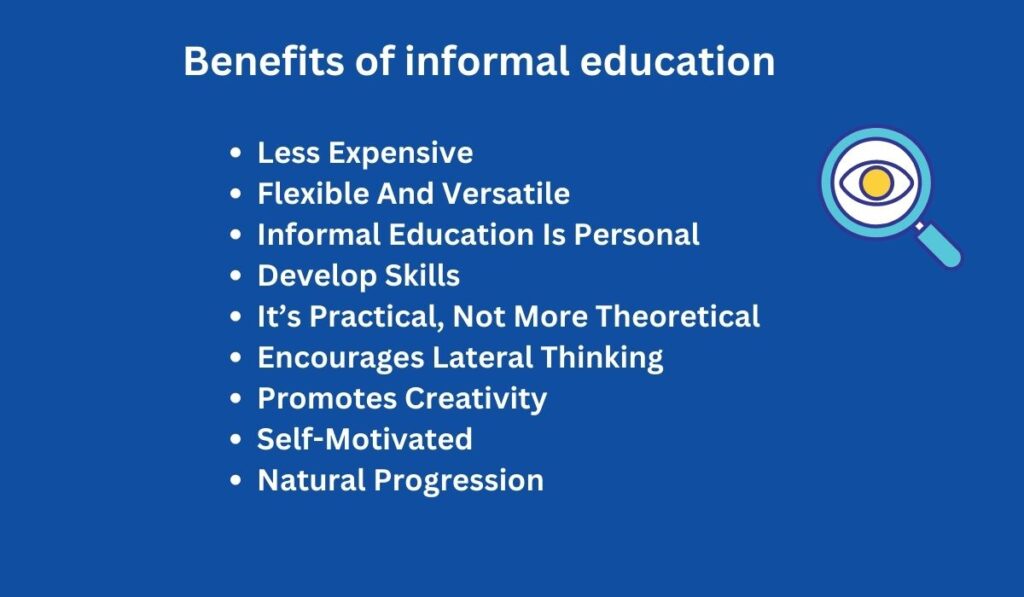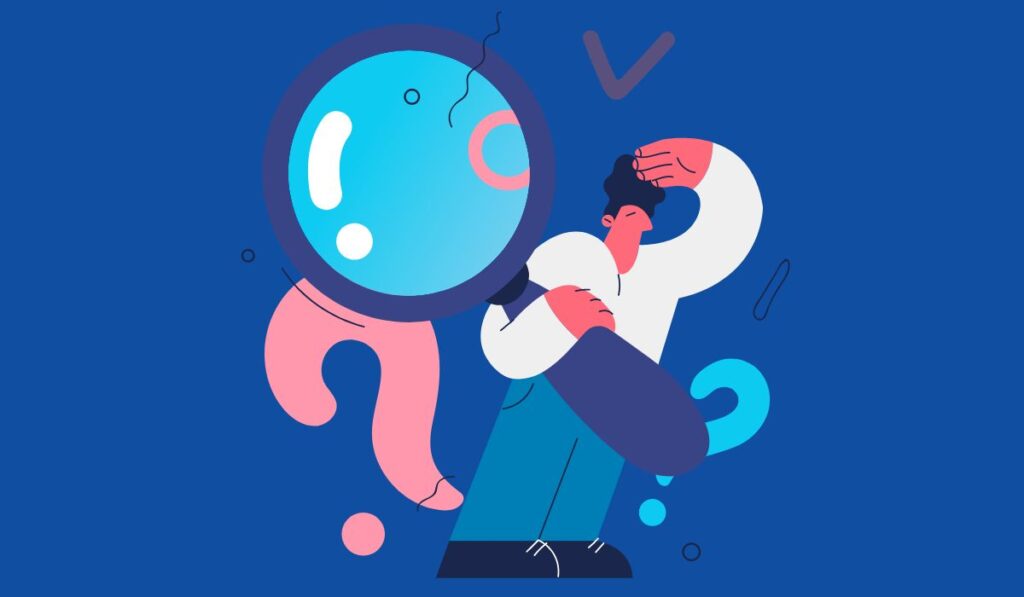Informal Education means learning something without an academic degree. We consider things like art and hobbies informal. It differs from formal education which is often taught in a classroom and comprises mostly academics.
Informal education is learning by doing or doing something repeatedly until you’ve learned it well enough that you can do it professionally. For example, a musician who is self-taught is learning informal education because he’s just doing it and not in a classroom setting. Let’s look at the advantages of informal education.
Examples of Informal Education
Informal education has influenced people like Mark Zuckerberg, Steve Jobs, and Bill Gates. These people spent a large part of their childhoods learning things that are informal. Mark Zuckerberg, for example, taught himself PHP at 13.
Informal education has its weaknesses. For example, if you’re self-taught, it may be hard to find a job if you don’t know about something that the other applicants know.
Importance of Informal Education
Like formal education, Informal learning can also give you knowledge and skills that you will need in your life. Informal education plays a vital part in society because of its usefulness.
Informal education can improve the quality of life and contribute to societal progress. It can achieve even the status quo and the progress of an economy through informal education.
We can learn important skills through informal education. It has the potential to bring about a better quality of life for all people.
Best Advantages of informal education
Nonformal education is very common in many countries of the world. Education is not just about learning. Education is also about developing values, skills, and knowledge. Here are some advantages of informal education.
1. less expensive
Informal learning is less expensive than formal ‘school’ education because it doesn’t need to be licensed and supported by the government. Individuals, groups, and communities can offer nonformal education.
There has been a huge increase in the number of nonformal education providers and nonformal education courses and programs. This is because more people are questioning formal schooling and its expensive overburdening system.
2. flexible and versatile
Formal education restricts us in terms of time, setting, and teaching styles. The time for formal education is fixed because it has to be taught in schools. In informal learning, however, a person can learn everything at his own pace.
Informal education has a flexible environment, and it is possible to learn in different settings. Informal education covers a wide range of subjects and topics.
3. Informal education is personal
The benefit of informal education is that it’s personal. Informal education can be easily customized according to your needs. We can adjust the duration and specific details of informal education as per the need.
4. Develop Skills
A person can develop skills and knowledge through informal education. Informal education facilitates the development of skills and knowledge that fit their needs. A person can learn anything they want under informal education and they can also share their knowledge with others.
5. It’s practical, not more Theoretical
Informal education is practical, not theoretical. A person can learn a skill without having to follow any specific course. It is possible to learn a new job skill or hobby by yourself in informal learning.
6. Encourages Lateral Thinking
A person can learn a new skill by themselves. This is called lateral thinking. The person learns at his own pace and decides in which direction to take the course. That is why informal education encourages lateral thinking and promotes creativity.
7. Promotes creativity
Informal learning advantages include the promotion of creativity. A person can learn about anything and create an activity around it. This is the key advantage of informal education. People who are self-taught can make tasks unique.
8. Self-Motivated
Learners in nonformal education are self-motivated. They are the ones who handle their success. An individual handles his own learning. There is no compulsion to study because the learning and studying process is voluntary.
9. Natural Progression
Natural progression means that a person learns by himself. There is no need for formal education to show that the person has completed his study. This is because informal learning does not require one to follow a certain course.
A person can start from the beginning and learn at his own pace without following a prescribed formula or curriculum. Nonformal education is flexible.
It’s a great way to learn new skills and do activities without having to follow a specific course or training class. A person learns to accord to his own pace because he can manage his learning time.

10. Easy to Learn
Learning something is a personal activity. A person learns not in a class but by himself. This is called self-directed learning which is personal and easy to learn. If we compare the formal education system to informal learning, it is better because a person doesn’t have to go to school and learn.
11. Affordable
The cost of informal education is very affordable because it is not compulsory. A person can learn anything because he/she has the freedom to learn. Affordability is a great merit of informal education. Poor people who have no money to go to school can learn through informal learning.
12. Time-Saving
Formal education needs a lot of time. This can be very troublesome for the workers and their families. Informal learning will not take a lot of time because there is no specific course or curriculum to follow.
13. Creates Jobs
Nonformal education develops skills that are useful for the economy. Such as manual skills, trades, information technology, and so on. They create many new jobs. Informal learning is like a course in a school or college. It is just like preparing a university student in case he wants to go to college.
14. Less Stressful
Children’s and adults’ stress level is less while they learn in informal education. They are not required to attend class hours and compete with their classmates. Informal learning is more relaxed and stress-free because a person has the freedom to learn at his own pace.
15. Promotes Independent Learning
Independent learning or self-reliance is an important benefit of informal education. A person learns according to his needs and wants. This encourages a person to learn in an environment that is easy, fun, and stress-free.
Learn More 20+ Advantages Of Co Education System In School And College Life 28 Benefits Of Art Education In Schools | Why Is Art Education Important What Are The 32 Benefits Of Physical Education In School The Benefits Of A College Education
FAQs
- It is not as structured as formal education.
- People who are self-taught may lack skills and knowledge.
- They can’t get a certificate.
- No specific course or curriculum to follow.
- It is often used as a replacement for formal education, rather than as an alternative to it.
What is the difference between formal and informal education?
Formal Education = Teacher under control, strict class times, school books, and so on.
Informal Education = Self-directed living, flexible learning time, learning by doing, and so on.
What is the purpose of informal education?
Its purpose is to teach skills and knowledge informally. Poor people and slum dwellers can learn through informal education.
What does informal education mean?
It is a process of self-directed learning and independent thinking. A person learns to accord to his/her needs and abilities. The process is done in a relaxed and comfortable learning environment. There is no need for a teacher or a specific course to follow.
What are the pros and cons of informal learning?
- Easy to follow
- Easy to learn
- Compact and concise
- Only one single book
- It is self-motivated
- Collected in a systematic way
- It is logical and easy to follow
Cons:
- It is not as structured as formal education.
- People who are self-taught may lack skills and knowledge.
- They can’t get a certificate.
- No specific course or curriculum to follow.
Conclusion
It is up to the individual whether he learns informally. The advantages of informal education are many. Some people will be reluctant to learn because of the lack of structure and formalism in informal education.
Non-formal education is not compulsory. Informal learning is more like a course in a school or college. It is different and unique because of the following reasons:
- A person learns according to his needs and abilities.
- A person learns at his own pace and can manage his time according to his own needs.
- People who go through informal education gain self-confidence.
- A person learns to work with others because he has the freedom to choose his learning process or activity.
But in my point of view, I’ll prefer both at the same time because they are different concepts at the same time they are related. Informal education is a learning process that teaches knowledge and skills to an individual according to his needs, abilities, and ability level. And formal education is a structured learning process based on curriculum and syllabus which helps students to get certificates.
We hope you have gained some knowledge on Informal Education Vs Formal Education. It’s a cat-and-mouse race between these two. We are still learning more about it and will update this page in the future with more info.

